By Harry Awurumibe, Africa’s No.1 Women Football Journalist
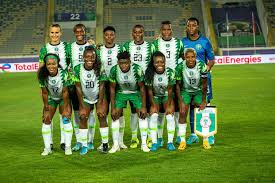
Nine-time-African-Champions…Super Falcons of Nigeria
Before 1990, not much was known or heard about women’s football at the continental level as only a few countries in Africa actually had organised women’s football structure, a situation which may have forced the Confederation of African Football (CAF) to pay little attention to the development of the women’s game in the continent.
However, things began to change for the better in the 1990s and in 1990, to be precise. CAF asked its Member Associations (MAs) or affiliates to send their entries to participate in the preliminaries of the maiden FIFA Women’s World Championship later (World Cup finals) held in China in 1991.
In response to the clarion call by CAF Nigeria, which had not formed women’s national team in 1990 curiously entered for the African qualifiers along with Ghana, Guinea Cameroon. Unfortunately, Senegal, Congo Brazzaville, Zambia, and Zimbabwe, which also entered for the African qualifiers played in a home and away basis, later withdrew for some reasons.
However, before the China’91 African qualifiers kicked off on February 16, 1991, Nigeria had moved fast to set up the first-ever national women’s football team with the players scouted from the 1st National Female Football Championship held in Lagos from September 14 to 23, 1990 which was organised by the Nigeria Female Football Proprietors Association NIFFPA but solely sponsored by a well-known Lagos-based sports philanthropist, educationist, and former Chairperson of Nigeria Football Association (NFA) now NFF, Princess Hannanh Ngozi Zainab Bola Jegede.
No fewer than 22 women’s football clubs from every state of Nigeria featuring players from every hamlet, community, and town in Nigeria participated in the week-long championship in Lagos. The competition was an eye opener as it exposed many talents that later played for the yet-to-be formed national team.
Among the top clubs of that era were Golden Wonders Ladies of Lagos, owned by Chief Christopher Abisuga, who was NIFFPA Chairman;
Western Zonal Chairman and proprietor of Ufuoma Babes of Warri, Elder Eddington Bola Kuejubola; Princess Jegede Babes FC of Lagos; Simbiat Abiola Babes of Abeokuta bankrolled by late Chief MKO Abiola’s first wife; late Chief Larry Eze led Rivers Marmaids now Rivers Angels FC, and Flying Babes FC of Lagos managed by Chief John Obijiaku.
With no financial and organisational imput from then NFA except sending two technical observers in the persons of assistant secretaries in the NFA Technical Department, late messers Joshua Banjo and Debbie Asagba, who only took notes of some exceptionally gifted players who were to form the foundation of the Super Falcons in January 1991.
However, uncertainty had trailed Nigeria’s participation in China ’91 African qualifying matches as the kick-off date drew close because the NFA had funds to prosecute the home and away matches and had remained silent over its inability to call players to camp earlier.
But the long silence by NFA on the lingering issues of lack of funds was broken when *Guardian Express* newspaper reporter HARRY AWURUMIBE confronted
the NFA acting Secretary General Mr. Momodu Kadiri early in January 1991 to know if Nigeria would still participate in China ’91 African qualifier series, which was fast approaching.
Kadiri sincerely told the reporter that there was no money to go ahead with the competition because neither the NFA nor the Federal Ministry of Sports under late Air Commodore Anthony Ikhazobor (rtd) had any plans to raise a national team due to lack of funds.
But he said that if the association receives funds before they February 1991 African qualifiers’ kick off, Nigeria will take part in the qualifiers, assuring that NFA was in possession of list of 50 players selected by its staff who monitored the 1st National Female Football Championship held in Lagos the previous year.
Luckily, 24 hours after the exclusive interview appeared on the backpage of Saturday, January 12,1991, of *Guardian Express*, a publication of The Guardian Newspapers Group, with the screaming headline: “China ’91: No Sponsors, No Female Action, says NFA”, some patriotic individuals and corporate bodies came to the rescue of the NFA with financial and material donations.
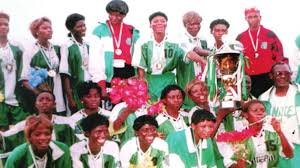
WAFCON-(AWC)-1998-Winners-Nigeria’s Super Falcons
As recorded in Chapter Five, page 34, of the first-ever book published in 1991 on the history of women’s football in Nigeria titled: *Genesis of Female Soccer in Nigeria* co-authored by Christopher Akintunde Abisuga and Harry Chidozie Awurumibe, some of the earliest donors to NFA were beverage manufacturing giants Cadbury Nigeria Plc, a major sponsor of the nation’s sporting activities which made a handsome cash donation of the sum of N250,000.00, a humongous amount of money 27 years ago in Nigeria.
Top officials of the company who came physically to the NFA old secretariat at Ogulana Road, Surulere, Lagos Mainland, on Monday, January 14, 1991, to make the cash donation also donated large quantities of branded sportswears to be used by the yet-to-be formed national team.
Also, a well-known sports philanthropist and women’s football club Mrs. Simbiat Abiola followed Cadbury’s good example by donating the sum of N50,000.00 for the upkeep of the players and construction giants, Julius Berger Nigeria Plc gave N3,000.00 while then First Lady Mrs. Maryam Babangida, wife of then Military President, General Ibrahim Badamasi Babangida, on hearing the financial constraints of the NFA, donated an undisclosed sum of money to ensure the association did the needful.
As money kept tumbling in and the February date of China ’91 African qualifiers approaching fast, the NFA realised that it had no option than to reach out for Banjo/Asagba Selection Committee’s players’ list compiled during the Princess Bola Jegede- sponsored 1st National Female Football Championship held in September 1990 in Lagos.
From the list, 50 players selected from 22 clubs that took part in the championship were invited to form the core of the maiden women’s team, while a list of three-man coaching crew was also invited to groom the players even as NFA’s lots fell on former Green Eagles player and later head coach, late Paul Ebiye Hamilton, as the co-ordinator. Ex- IICC Shooting Stars of Ibadan coach Niyi Akande and David Oyamunugha, a coach with Lagos State Sports Council, were picked to assist coach Hamilton.
Only 12 days after the *Guardian Express* newspaper’s report and few days after the list of 50 invited players were published in the national media outlets, the first set of players reported to the team’s camp at Games Village at Eric Moore Road,Bode-Thomas in Surulere, Lagos.
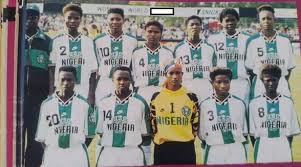
Super Falcons-Sweden-1995
Thus, the first set of what later became the Super Falcons of Nigeria was born on January 23, 1991, when a few invited players, including Edith Eluma, Adaku Okoroafor, Onyinyechi Chukwuma, and Omolara Fadiji arrived camp just as the first screening session of players the players commenced on Thursday, January 24, 1991, at the practice pitch of the iconic National Stadium Surulere, Lagos.
The rest is history as the newly formed Nigeria’s women team went ahead to demolish the Black Queens of Ghana 5-1 in the epic first leg of China ’91 African qualifiers tie at National Stadium Surulere in Lagos on Saturday, February 16, 1991in the presence of an A-list fans including First Lady Maryam Babangida; Sports Minister Major-General Yohanna Kure (rtd) and ex-Chairman of NFA Ahaji Yusuf Alli.
Also, at the stadium to cheer, the girls were NFA Secretary Momodu Kadiri, women’s football club owners Christopher Abisuga, Princess Bola Jegede, Mrs. Simbiat Abiola, Elder Eddington Kuejubola, Pa Joseph Othowowa, Dr. Rafiu Ladipo, President of Nigeria Football Supporters Club (NFSC), who volunteered as Flagbearer for the women’s team, which was renamed Super Falcons, after trashing the Ghana girls in Lagos, by ex-First Lady Maryam Babangida.
Since the rare performance in their first match on February 16, 1991, Super Falcons have not looked back as they have grown from strength to strength and went ahead to beat Ghana, Guinea, and Cameroon to represent Africa in the 1991 FIFA Women’s World Championship.
Four years later, Nigeria also eliminated every opposition, including South Africa, in the final round to qualify to represent CAF as the sole representative at the 2nd FIFA Women’s World Cup finals in Sweden in 1995. Nigeria qualified on 11-2 aggregate score after two heavy defeats of the South Africans.
The Super Falcons walloped hapless Banyana Banyana 4-1 in the first leg African qualifiers played at Adamasingba stadium, Ibadan on March 4, 1995, while the South Africans suffered a humiliating 7-1 in the return leg tie on March 18, 1995, in Johannesburg.
Perhaps it was the domineering stance of Super Falcons that prompted CAF hierarchy under former President late Monsieur Issa Hayatou to decide to introduce championship rather than continuing with the home and away format to select African representatives at the FIFA Women’s World Cup finals.
Again, with the introduction of WAFCON in 1998, Super Falcons have gone ahead to lift the trophy a record nine times, winning the first CAF Gold Cup donated by Nigeria’s ex-First Lady Mrs.Maryam Sani Abacha for keeps in 2002, by virtue of being champions in 1998, 2000 and 2002.
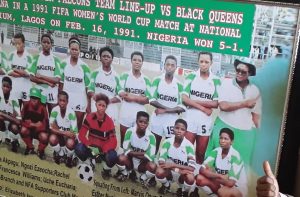
Pioneers….Super Falcons-199I
Also, Nigeria has an enviable record of winning the WAFCON trophy five straight times from 1998 to 2006 before Equatorial Guinea snapped Nigeria’s winning streak in 2008 by lifting the trophy on home soil just as Nigeria won it back in 2010 but Equatorial Guinea bounced back to win her second trophy as host of the 2012 edition.
Still hungry for more trophies, Nigeria returned to the winning ways in WAFCON 2014 in Namibia, 2016 in Cameroon,and 2018 in Ghana, respectively, to be the indisputable champion of Africa, the “Colossus”, “Monster team”, ” Behemoth”, and “Odogwu” of Africa.
May the winning streak continue in Morocco 2024. May Mission X become a reality on July 26, 2025, at Olympic Stadium, Rabat.
Awurumibe, a vocal women’s football advocate
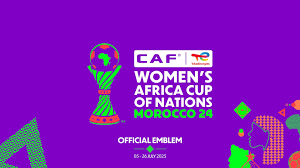




 Sports Revelation Online ..breaking authenic sports reports
Sports Revelation Online ..breaking authenic sports reports